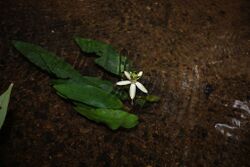Biology:Barclaya
| Barclaya | |
|---|---|

| |

| |
| Barclaya longifolia | |
| Scientific classification | |
| Kingdom: | Plantae |
| Clade: | Tracheophytes |
| Clade: | Angiosperms |
| Order: | Nymphaeales |
| Family: | Nymphaeaceae |
| Genus: | Barclaya Wall. |
| Type species | |
| Barclaya longifolia Wall.[1] | |
| Synonyms[2] | |
| |
Barclaya is a genus of six species of flowering plants of the family Nymphaeaceae.[2] Barclaya are aquatic plants native to tropical Asia. The genus was named in honour of the American-born English brewer and patron of science Robert Barclay.[3][4]
Description
Plants grow from egg-shaped tubers that produce short runners and a basal rosette of leaves. All leaves are submerged.[3]
Taxonomy
Publication
The genus Barclaya Wall. was first published by Nathaniel Wallich in 1827.[2] Though Hydrostemma is a name that is older than the name Barclaya, having been published 6 months earlier, the name Barclaya has been "conserved" as it was deemed being much better known than Hydrostemma.[5]
Species
| Flower | Species[2] | Distribution |
|---|---|---|
 |
Barclaya longifolia Wall. | Indochina |
| Barclaya motleyi Hook.f. | Indonesia (Irian Jaya, Kalimantan, Sumatra), New Guinea (Idei 2010), Peninsular Malaysia | |
| Barclaya panchorensis Komala | Malaya Peninsula[6] | |
| Barclaya rotundifolia M.Hotta | Sarawak, Johore, Malaysia[7] | |
| Barclaya rugosa Sofiman Othman & N.Jacobsen | Malaya Peninsula[8] | |
| Barclaya wellyi Wongso, Ipor & N.Jacobsen | Sumatra[9] |
Disputed species include:
- Barclaya hirta (Kurz ex Teijsm. & Binn.) Miq.
- Barclaya kunstleri (King) Ridl.
They were resurrected in a recent revision of the genus,[1] but are not accepted by some other sources, such as Plants of the World Online of Royal Botanic Gardens, Kew.[2]
Rejected classification
The separate family Barclayaceae H.L.Li was published in 1955.[10] It has been believed to be separate, due to the extended perianth tube (combined sepals and petals) arising from the top of the ovary and by stamens that are joined basally. However, morphological and genetic studies support the position of Barclaya in the family Nymphaeaceae.[11] A separate order Barclayales Doweld was proposed in 2001.[12][13]
The accepted placement of Barclaya is within the family Nymphaeaceae of the order Nymphaeales.[14]
Cytology
The diploid chromosome count is 2n = 36.[1]
Habitat
Within tropical rainforests, Barclaya develops alongside streams or at their fringes. The escalating deforestation across Southeast Asia is causing the habitats to become clouded, endangering Barclaya.[15]
Conservation
The IUCN conservation status of Barclaya longifolia is least concern (LC).[16] The IUCN conservation status of Barclaya motleyi is data deficient (DD).[17]
Cultivation
Barclaya longifolia is a popular aquarium plant.[18][5][19] Under high light conditions the attractive, upright foliage displays green colouration. Under lower light conditions brownish foliage is produced.[20] It easily sets seed in cultivation, if pollen is deposited on the stigma.[21]
References
- ↑ 1.0 1.1 1.2 Jacobsen, N., Ganapathy, H., Ipor, I., Jensen, K. R., Komala, T., Mangsor, K. N., ... & Ørgaard, M. (2022). "A reassessment of the genus Barclaya (Nymphaeaceae) including three new species." Nordic Journal of Botany, 2022(5), e03392.
- ↑ 2.0 2.1 2.2 2.3 2.4 "Barclaya Wall." (in en). Royal Botanic Gardens, Kew. http://www.plantsoftheworldonline.org/taxon/331386-2. Retrieved 30 June 2023.
- ↑ 3.0 3.1 Slocum, Perry D. (2005). Waterlilies and Lotuses: Species, Cultivars and New Hybrids. Timber Press. ISBN 978-0-88192-684-2. http://www.timberpress.com/books/isbn.cfm/9780881926842/waterlilies_lotuses/slocum. Retrieved 2008-12-30.
- ↑ Wallich, Nathaniel (1827). "Description of a new genus of plants belonging to the order Nymphaeaceae". Transactions of the Linnean Society of London 15: 442–448, Tab. 18. doi:10.1111/j.1095-8339.1826.tb00125.x.
- ↑ 5.0 5.1 Crusio, W. E.; J. Bogner (1984). "Proposal to conserve 2515 Barclaya against Hydrostemma (Nymphaeaceae)". Taxon 33 (3): 517–519. doi:10.2307/1221000.
- ↑ "Barclaya panchorensis Komala" (in en). Royal Botanic Gardens, Kew. http://www.plantsoftheworldonline.org/taxon/77302904-1. Retrieved 30 June 2023.
- ↑ Jacobsen, Niels; Ipor, Isa B.; Bogner, Josef (2007). "Über die Kultur von Barclaya-Arten (Nymphaeaceae)". Aqua Planta 32: 86–93.
- ↑ "Barclaya rugosa Sofiman Othman & N.Jacobsen" (in en). Royal Botanic Gardens, Kew. http://www.plantsoftheworldonline.org/taxon/77302907-1. Retrieved 30 June 2023.
- ↑ "Barclaya wellyi Wongso, Ipor & N.Jacobsen" (in en). Royal Botanic Gardens, Kew. http://www.plantsoftheworldonline.org/taxon/77302908-1. Retrieved 30 June 2023.
- ↑ "Barclayaceae H. L. Li". Global Biodiversity Information Facility. https://www.gbif.org/species/100035282.
- ↑ Schneider, E. L. (1978). "Studies of the Nymphaeaceae. IX. The Seed of Barclaya longifolia Wall". Botanical Gazette 139 (2): 223–230. doi:10.1086/336993.
- ↑ "Family Barclayaceae - Hierarchy". Universal Taxonomic Services. http://taxonomicon.taxonomy.nl/TaxonTree.aspx?id=4774.
- ↑ Reveal, J. L.; Chase, M. W. (18 February 2011). "APG III: Bibliographical Information and Synonymy of Magnoliidae". Phytotaxa 19 (1): 71–134. doi:10.11646/phytotaxa.19.1.4.
- ↑ Borsch, T., Löhne, C., & Wiersema, J. (2008). "Phylogeny and evolutionary patterns in Nymphaeales: integrating genes, genomes and morphology." Taxon, 57(4), 1052-4E.
- ↑ Endress, P. K., & Friis, E. M. (2012). Early evolution of flowers. Springer Science & Business Media.
- ↑ Juffe Bignoli, D. 2011. Barclaya longifolia. The IUCN Red List of Threatened Species 2011: e.T194024A8877322. https://dx.doi.org/10.2305/IUCN.UK.2011-1.RLTS.T194024A8877322.en. Accessed on 04 January 2024.
- ↑ Allen, D.J. 2011. Barclaya motleyi. The IUCN Red List of Threatened Species 2011: e.T194023A8877027. https://dx.doi.org/10.2305/IUCN.UK.2011-2.RLTS.T194023A8877027.en. Accessed on 04 January 2024.
- ↑ Les, D. H. (2001). "Nymphaeales". e LS.
- ↑ Bailey, Mary; Burgess, Peter (1999) (in en). Tropical Fishlopaedia: A Complete Guide to Fish Care. Ringpress. ISBN 978-1-86054-102-5. https://books.google.com/books?id=Vd6sBfAxno8C.
- ↑ Alderton, David (2019-02-07) (in en). Encyclopedia of Aquarium and Pond Fish. Dorling Kindersley Limited. ISBN 978-0-241-44442-9. https://books.google.com/books?id=kcXhDwAAQBAJ.
- ↑ Miller, Philip (1835) (in en). The gardeners dictionary. https://books.google.com/books?id=Kl8DAAAAQAAJ.
External links
Wikidata ☰ Q2624326 entry
 |
